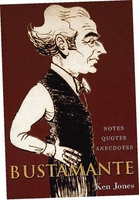
Title: Bustamante
Notes, Quotes, Anecdotes
Author: Ken Jones
Reviewer: A. W. Sangster
Author and publisher, Ken Jones is well versed with the life and times of Sir Alexander Bustamante, having previously written The Best of Bustamante and collaborated with his widow in producing The Memoirs of Lady Bustamante.
This latest publication, Bustamante, Notes Quotes Anecdotes is, therefore, an appropriate companion to the early volumes. As suggested by the sub-title, the book of some 250 pages is like Caesar's Gaul divided into three parts. The parts together form a consistent whole and capture through humour and fact, the legacy of Sir Alexander Bustamante, the first and only (so far) person named national hero in his or her lifetime.
The author pays tribute to The Gleaner Company for the support received in his research and lists many others who have contributed to the volume. He also notes that over his extensive involvement in Jamaican life, Bustamante touched the lives of numerous persons from all walks of life.
An extensive Prologue by newspaperman Ulric Simmonds, written after Sir Alexander's death pays tribute to the memory of this giant - a politician without equal, and a nation builder who moved his people to purposeful action. The author in his acknowledgement remarks:
"In this book the reader will find an authentic story of the great Bustamante, as portrayed by lasting friends and temporary foes. They all acknowledge, as do I, that this was a man most extraordinary".
Part one, Notes, is prefaced by a list of 'Firsts' including being the first political party leader to win general elections under adult suffrage in 1944; the first chief minister and Cabinet leader under the Ministerial system in 1953; and the first prime minister of independent Jamaica in 1962.
important stories
While not a history, there are numerous occasions in the text in which the author quotes Bustamante to set the record straight. One such item is his prison/detention experience, and the traditional story that Norman Manley secured his release, is subject to major correction. The topic is listed as: Who Freed Busta from Detention? Another historical correction is listed under the title: That 49 Majority. The note corrects the perception that in those elections the PNP had a majority vote while the JLP had a majority of seats.
Some of the important stories that come out in this section are:
Bustamante's emergence as a trade union leader; his fragile connection and later break with the People's National Party and his contact and support for the ideas of Marcus Garvey. He quotes the frustration that Garvey knew and who put it this way:
"Yes, but if one wants to know what sorrow is, try and do good for the masses of this country and 'big brains' will plot, conspire, and do everything to destroy you and your name".
Bustamante remarked that Garvey's words lingered with him and Garvey's life and work and mission would have proved an inspiration to him as he too faced later challenges in his struggle for the masses of the country.
The section closes with a record of the establishment of the Bustamante Foundation which has awarded more than 60 scholarships in its more than 40 years of existence.
Part two, Quotes, is prefaced with an index of some 70 quotes from the great man. The quotes indicate the breadth of Sir Alexander's knowledge and insights into issues of the day and his ability to capture in a few words the essence of the matter.
On Back to Africa, Busta's comment was ... forget about Africa until you have enough money to go there yourself and work in the interest of your own county where you were born - Jamaica (1963).
On children, his comment was ... I never had any children, not even one. But then, I may have had a son and he turned out to be a damned rascal (1967).
On Education, his comment was ... it does not take education to have a humane heart (1946).
On Power, his comment was ... It is a sick mind, a pathological one, that would prey upon the economic conditions of the multitude to gain political power, without having demonstrated the ability to help them (1961).
humour
Part Three, Anecdotes, deals with a variety of issues and the interaction that he had with numerous persons during his life and work in Jamaica. There is humour and the common repartee that is part of the political life of the country. A typical example is the following.
On the question of the prime minister's residence and Vale Royal being discussed as being suitable, the record is as follows:
In a sharp debate in the House of Representatives, Norman Manley declared, "Everybody who has seen the place recognises that it is admirably suited for the purpose of a residence for any ordinary prime minister of this country". Busta shot back: "You would be an ordinary one, cousin. I have the strongest objection by your terming me as ordinary."
Many of the anecdotes speak of his generous and forgiving nature, his high regard for women, his sense of justice, fair play and his skill at repartee in the cut and thrust of politics.
The book is due to be launched at King's House on Thursday of October 29, and there will be opportunities for the author to sign copies.